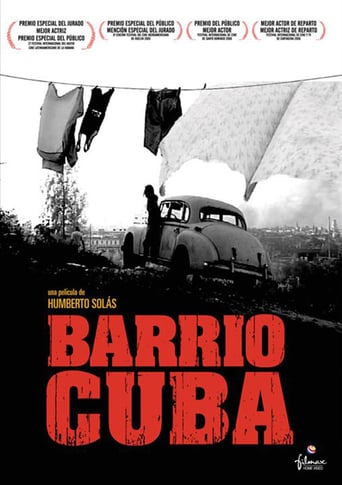jotix100
The lives of ordinary Cuban citizens living in a poor neighborhood of Havana are examined. The daily struggle for survival of these people caught in one of the poorest countries of the hemisphere takes center stage in Humberto Solas' ambitious tale of life in contemporary Cuba. In fact, one wonders how could the director get away with some of his critical views of what is really happening. Like Fernando Perez's in "Suite Havana", this film takes a hard look at what it is like to live in today's Cuba.The film starts as a woman is taking a bath using a can to rinse herself. This neighborhood of Havana obviously lacks running water. The feeling of the place is much like a 'favela', or marginal slum, devoid of any material comforts. The one thing in common is that everyone is poor. The only exception is Chino's family who might be considered middle class, in comparison with the others in the film.Their meager access to food is made clear. Some enterprising individuals resort to stealing from the government whatever they can barter for something they, or someone else will need to make a swap. This is the case with the family that has nothing but rice and beans to eat, and suddenly someone brings a big piece of meat from one of the places only reserved for hard currency payment, or for tourists. Corruption seems to be everywhere, in spite of the propaganda. Necessity creates this type of mentality when there is nothing else around, not even hope. The narrative interlaces several individuals that don't necessarily know one another. It is a favorite technique employed with success by the Mexican director Alejandro Gonzalez Inurritu and others. Mr. Sola, the director tried to encompass a lot of wrongs he saw in a political and social system, that, like all totalitarian regimes, doesn't seem to work. Thus, the only escape from their humdrum existence is leaving the country. Humberto Solas, who died not too long ago, enjoyed his success in the Cuban cinema, notably for "Lucia" the film that propelled him into the recognition he deserved.
Otto Rodriguez
Barrio Cuba is one of those movies that become memorable in an instant. It reflects crudely the Cuban reality. The plots don't need political discourses, they are dramatic and crude enough. It shows a country in ruins and the hopeless state of mind of Cubans. You have to have lived in Cuba or at least be extremely familiar with the Cuban reality to really grasp what this movie is all about. In my view the only flaw is that at the end Solas had the opportunity to beautifully link all the three plots in at least two different scenes, the one of Mario Limonta standing in front of a train and the scene at the airport, where a Cuban family is returning to visit their relatives in the island. Kudos to Humberto Solas!
teesee_03
This is an awful movie, on so many levels. Technically, it's simply inept; it is shot with little or no supplementary lighting, so the interior scenes appear muddy, with large areas of murky shadow. The colours generally are drab and washed out.To call the script melodramatic is an understatement - any of these situations could have been transplanted from a low-budget soap. These filmmakers need to realise that getting the actors to cry a lot doesn't guarantee that the audience will, too. Embarrassed laughter was the main response at the showing I attended.Finally, there is little that is uniquely Cuban about the the situations in this movie. Yes, it does show that life for the poor in Cuba is not wonderful, but it would have been better if the movie had explored more deeply *why* the situation of the characters is so desperate, and what it is about Cuba, its economy and its political situation that means that its people have to live that way.I was looking forward to seeing this film, but I came away from it deeply disappointed; unfortunately, the good intentions which may have been behind it simply couldn't make up for an overwhelming lack of talent.
mediatext
Of all the Cuban movies than I have seen, this is by far the worst of all (and believe me, I have suffered many a bad one). Production values are so incredibly poor that you realize that the concept "cine pobre" that the director subscribes is just an excuse for an extreme lack of talent. From the content point of view, this movie also --like other Cuban productions-- asserts, in veiled but irrefutable ways, that Cubans, not Castro's revolution, are the culprits for the island terrible situation. Also, acting is very amateurish and the cinematography very old style. It's boring, repetitive, dogmatic, clichéd, and very, very passé (looks like a bad Brazilian movie from the 60's.)Don't waste your time or money on this abysmal and politically biased production.
